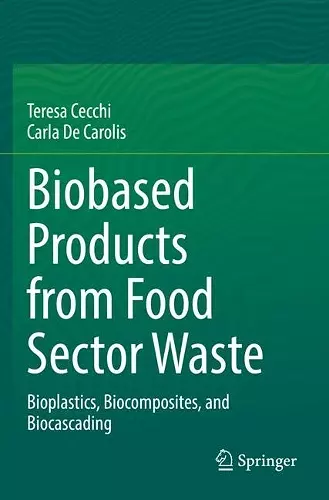Biobased Products from Food Sector Waste
Bioplastics, Biocomposites, and Biocascading
Teresa Cecchi author Carla De Carolis author
Format:Paperback
Publisher:Springer Nature Switzerland AG
Published:20th Oct '22
Currently unavailable, and unfortunately no date known when it will be back
This paperback is available in another edition too:
- Hardback£159.99(9783030634353)

This insightful book examines innovative uses of food waste in biorefineries, advocating for sustainable practices and the development of high value-added products.
In recent years, food waste has been increasingly recognized for its potential beyond mere disposal. Biobased Products from Food Sector Waste delves into the innovative applications of food waste in biorefineries, emphasizing its role in fostering a circular economy. The book addresses the ethical implications of utilizing food waste as a resource while proposing practical technologies and procedures that align with sustainable development goals. By exploring the zero-waste concept, it highlights the importance of transforming food waste into valuable products rather than allowing it to contribute to environmental degradation.
The volume meticulously categorizes various sources of food waste and presents a plethora of high value-added compounds that can be derived from it. These include platform chemicals, enzymes, nutraceuticals, and organic acids, among others. The authors explain the processes involved in a sequential biocascade, utilizing chemical, biochemical, thermal, and physical technologies to create these compounds. Furthermore, the synthesis of bioplastics and biocomposites from food scraps is discussed, illustrating the benefits of reducing waste disposal costs and minimizing the use of edible resources in creating biobased materials.
Additionally, Biobased Products from Food Sector Waste addresses the socioeconomic and environmental implications of upcycling food waste. It provides insights into safety considerations and life cycle assessments of biobased products. The authors also explore how advancements in digital technology can facilitate cost-effective food waste upcycling and share best practices for implementing the biorefinery concept. The book concludes with recommendations for effective food waste management, especially in light of challenges posed by the COVID-19 pandemic.
ISBN: 9783030634384
Dimensions: unknown
Weight: unknown
427 pages
2021 ed.